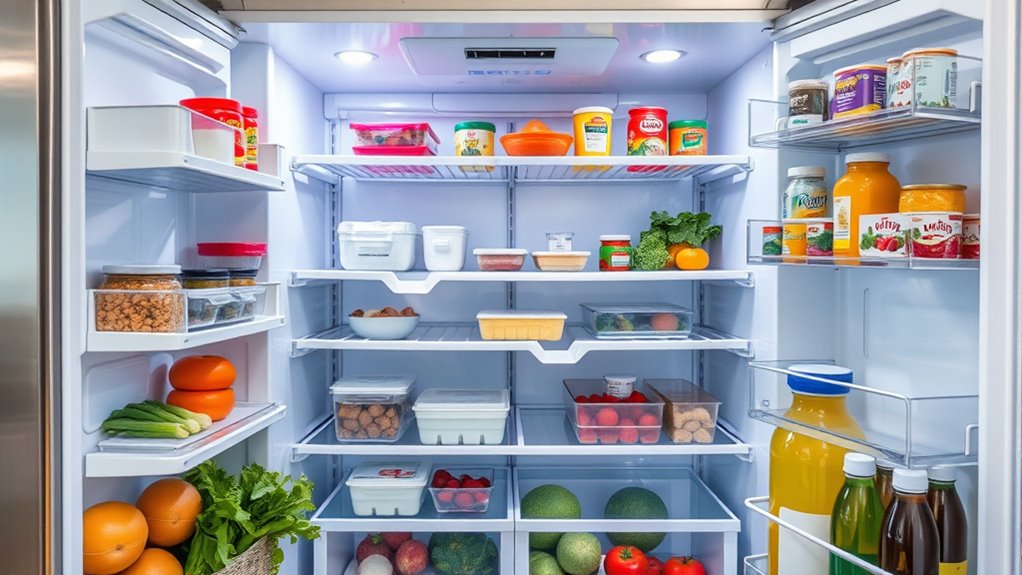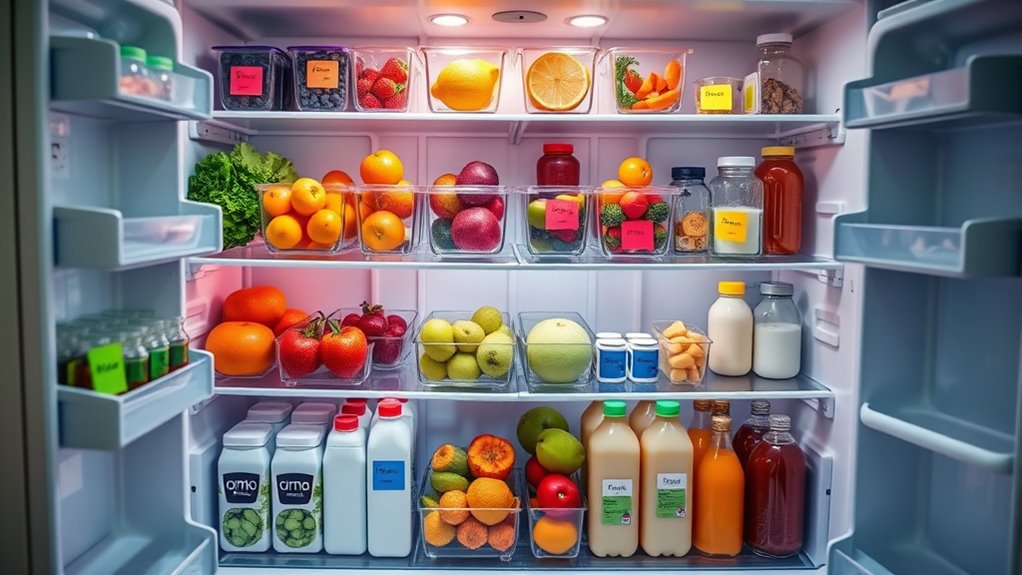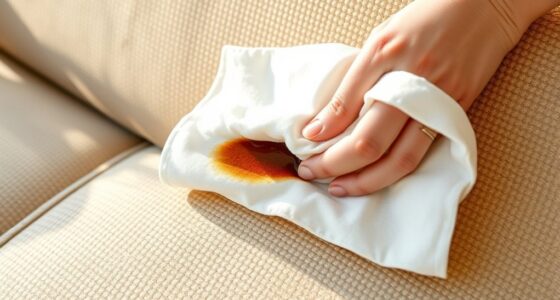To keep your food safe during a fridge clean-out, you should remove all items first, then discard anything past its expiration date or spoiled. Wipe shelves, walls, and drawers thoroughly with warm, soapy water or disinfectant, making sure everything dries completely. Store raw meats on the bottom shelf and use sealed containers for leftovers. Maintaining a clean, organized fridge prevents bacteria growth and keeps food fresh longer—stick around to learn more safe food rules.
Key Takeaways
- Remove all items and check expiration dates; discard any spoiled or outdated foods before cleaning.
- Store raw meats on the bottom shelf to prevent drips and cross-contamination.
- Keep dairy and perishable items in the coldest section, usually near the back of the fridge.
- Wipe shelves, drawers, and walls with warm, soapy water or disinfectant, ensuring all spills are thoroughly cleaned.
- Dry all surfaces completely before restocking to prevent mold and bacterial growth.

When was the last time you gave your fridge a thorough clean-out? If it’s been a while, now’s the perfect time to do it. A clean fridge isn’t just about hygiene; it’s essential for food preservation and safe eating. Clearing out expired or spoiled items helps prevent cross-contamination and keeps your food fresh longer. Plus, a tidy fridge makes it easier to find what you need, reducing waste and saving money.
Start by removing everything from your fridge. As you do, check each item’s expiration date and discard anything that’s past its prime. Be ruthless—perishable foods like dairy, meat, and leftovers shouldn’t be kept beyond their recommended shelf life. Once you’ve cleared out the old, wipe down all shelves, drawers, and walls with warm, soapy water or a gentle disinfectant. This not only removes spills and stains but also helps eliminate bacteria. Make sure to dry everything thoroughly before replacing items.
Remove all items, check expiration dates, and wipe down surfaces thoroughly.
Incorporating automation in food storage can help you maintain optimal freshness by reminding you when to use or discard items, reducing waste over time.
When restocking, pay attention to food preservation principles. Store raw meats on the bottom shelf to avoid drips contaminating other foods. Keep dairy products in the coldest section, usually near the back of the fridge, to maximize freshness. Use clear containers or sealed bags for leftovers, which helps prevent spoilage and keeps your fridge organized. Proper storage tips also include labeling items with dates so you know exactly when they were made or opened. This way, you’re less likely to forget about leftovers or buy duplicates unnecessarily.
Arrange your fridge so that frequently used items are within easy reach, and less-used items are stored towards the back or top shelves. This not only streamlines your routine but also ensures that food stays at the ideal temperature longer, promoting food preservation. Regularly check for expired or spoiled items—doing this weekly can save you from accidental consumption of unsafe food. Also, avoid overcrowding your fridge, as proper air circulation is crucial for maintaining a consistent temperature. When air can circulate freely, food stays fresher, longer, and the risk of bacteria growth diminishes.
Incorporating these storage tips helps you build a habit of safe food handling. Keep your fridge clean and organized, and you’ll notice an improvement in the quality and safety of your food. Not only does it prevent illness, but it also reduces waste and saves money in the long run. Remember, a well-maintained fridge is the cornerstone of good food preservation, so give it the attention it deserves. Regular clean-outs might seem like a chore, but they’re a simple, effective way to keep your food safe and your kitchen running smoothly.
Frequently Asked Questions
How Often Should I Clean My Fridge Thoroughly?
You should clean your fridge thoroughly at least once every three to four months to maintain proper fridge maintenance. Regular cleaning helps prevent mold, bacteria, and unpleasant odors. Follow a consistent cleaning schedule, removing expired or spoiled food and wiping down shelves and drawers. This routine keeps your fridge safe, hygienic, and functioning efficiently. Don’t forget to check for leaks or spills during each cleaning to make sure everything stays in top condition.
Can I Use Vinegar to Disinfect My Fridge?
Yes, you can use vinegar cleaning to disinfect your fridge safely. Vinegar is a natural disinfectant that helps eliminate bacteria and mold, promoting food safety. Mix equal parts of white vinegar and water, then wipe down all surfaces inside your fridge. This method is effective, eco-friendly, and free from harsh chemicals. Remember to rinse with clean water afterward and dry thoroughly to keep your fridge clean and safe for storing food.
What Are the Signs of Spoiled Food?
Spoiled food often sneaks up on you with signs like a sour smell or slimy texture, even before expiration dates pass. You’ll notice mold growth or unusual discoloration, which signals it’s time to toss it out. While some foods last beyond their dates, trust your senses—if it smells off, looks moldy, or feels sticky, it’s spoiled. Always prioritize safety to avoid foodborne illnesses.
How Should I Organize Leftovers for Safety?
You should use proper storage by placing leftovers in airtight containers and keeping them at the back of the fridge to maintain a consistent temperature. Label your containers with date and contents using clear labeling techniques, so you know when to consume or discard them. Always store leftovers within two hours of cooking, and try to consume them within 3-4 days to ensure safety and freshness.
Is It Safe to Store Produce in the Fridge Door?
Storing produce in the fridge door might seem convenient, but imagine your fresh strawberries or leafy greens exposed to fluctuating temperatures with each door open. For ideal produce storage, keep fruits and veggies in the fridge’s main compartments where the temperature stays consistent. The fridge door’s warmer, unstable environment can cause produce to spoil faster, reducing freshness and safety. Keep produce in the proper drawers for longer-lasting, safer freshness.
Conclusion
Think of your fridge as a garden—you need to clear out dead leaves and overgrown weeds to keep everything healthy. Regularly cleaning and discarding expired food prevents spoilage from taking root, ensuring your kitchen stays fresh and safe. By staying vigilant and practicing these safe food rules, you’re nurturing a clean, vibrant space. Remember, a tidy fridge is the foundation of good health—tend to it like a treasured garden, and it’ll reward you with delicious, worry-free meals.









